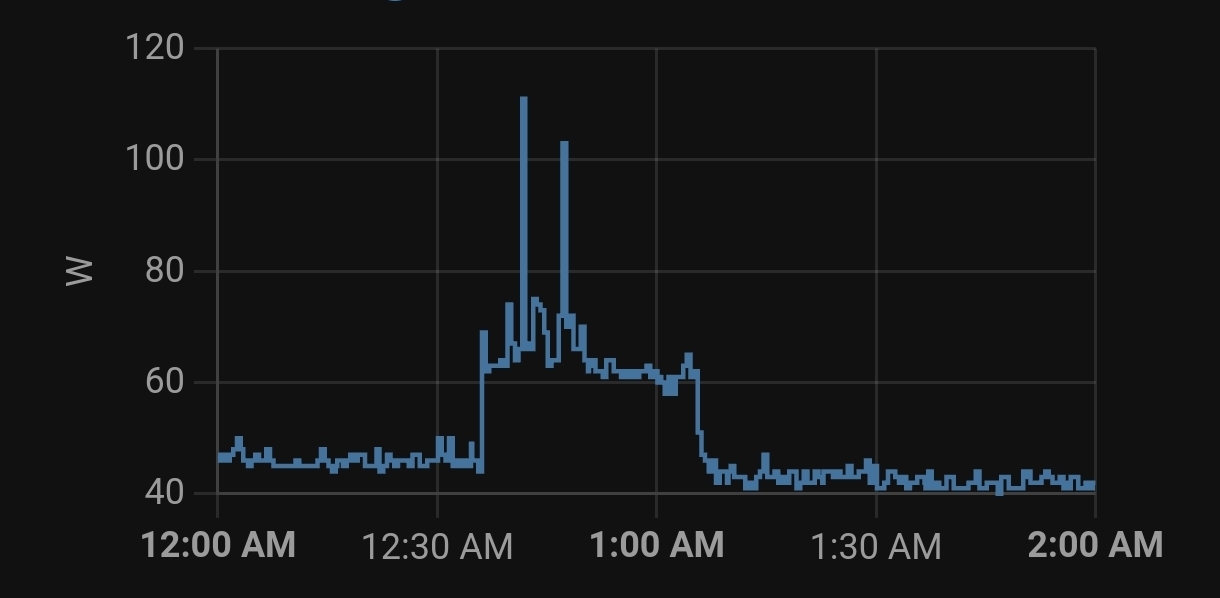- 4 Posts
- 243 Comments

 26·2 years ago
26·2 years agoI mean, a huge number of redditors moved here because of reddit enshittification.

 3·2 years ago
3·2 years agoFor comparison, I run a thinkstation p300 with i7-4790 (TDP 84W) 24/7 and the power usage looks like this:

Even when idling this old processor still guzzles 45W. Certainly not as nice as GP’s that only use 10W during idle.

 2·2 years ago
2·2 years agoPower scaling for these old CPU is not great though. Mine is slightly newer and on idle it still uses 50% of the TDP.

 2·2 years ago
2·2 years agoXeon E5-2670, with 115W TDP, which means 2x115=230W for the processor alone. with 8 ram modules @ ~3W each, it’ll going to guzzle ~250W when under some loads, while screaming like a jet engine. Assuming $0.12/kwh, that’s $262.8 per year for electricity alone.
Would be great if you have an isolated server room to contain the noise and cheap electricity, but more modern workstation should use at least 1/4 of electricity or even less.
Google Reader was the best. Not sure why Google killed it, but it was really good at both content discovery and keeping up with sites you’re interested in. I tried several alternatives but nothing came close, so I gave up and hung out more on forums / link aggregators like slashdot, hacker news, reddit and now lemmy for content discovery. I’m also interested to hear what others use.

 2·2 years ago
2·2 years agoI wonder which one came first, clothing or hairless skin?

 5·2 years ago
5·2 years agoI think every programmer should know how to write frontend and backend code, and how to deploy their code. Sure, everyone has their own specialization and things they like to do, but that doesn’t mean they should be ignorant of all aspects of software development.

 2·2 years ago
2·2 years agoNever thought that home assistant os would actually use docker under the hood. I thought it’s running home assistant directly with supervisor method.

 2·2 years ago
2·2 years agoCould be cdn issue. Try updating your router setting to use cloudflare dns or google dns. Some people fixed similar issue by using those dns servers.

 1·2 years ago
1·2 years agoIs this the tutorial you followed? https://www.home-assistant.io/installation/generic-x86-64
On which step did you encounter the error? The step where the home assistant os already written to the target disk and you’re told to restart the system with usb stick unplugged?
http error 500 when downloading the container image might be a temporary error on github docker repo side. Try restarting the device and see if the error persist.

 3·2 years ago
3·2 years agoFrom the posted log, it appears to try to download
ghcr.io/home-assistant/generic-x86-64-homeassistant:2024.4.4docker image and failed due to http 500 server error .Can you post how you were trying to install home assistant? E.g are you using docker compose?

 2·2 years ago
2·2 years agoWhy not using
ghcr.io/home-assistant/home-assistant:2024.4.4?
Yes, but autossh will automatically try to reestablish connection when its down, which is perfect for servers behind cgnat that you can’t physically access. Basically setup and forget kind of app.

 11·2 years ago
11·2 years agoI wonder what kind of “education” he received in the camp? Did they serve him booze and tobacco everyday?
If this server is running Linux, you can use autossh to forward some ports in another server. In this example, they only use it to forward ssh port, but it can be used to forward any port you want: https://www.jeffgeerling.com/blog/2022/ssh-and-http-raspberry-pi-behind-cg-nat

 22·2 years ago
22·2 years agoBy “remotely accessible”, do you mean remotely accessible to everyone or just you? If it’s just you, then you don’t need to setup a reverse proxy. You can use your router as a vpn gateway (assuming you have a static ip address) or you can use tailscale or zerotier.
If you want to make your services remotely accessible to everyone without using a vpn, then you’ll need to expose them to the world somehow. How to do that depends on whether you have a static ip address, or behind a CGNAT. If you have a static ip, you can route port 80 and 443 to your load balancer (e.g. nginx proxy manager), which works best if you have your own domain name so you can map each service to their own subdomain in the load balancer. If you’re behind a GCNAT, you’re going to need an external server/vps to route traffics to its port 80 and 443 into your home network, essentially granting you a static ip address.
Someone actually did a comparison recently. Pretty interesting if you got the time to read it: https://danluu.com/seo-spam/ . tldr: google and bing bad.
There is also a recent study by researchers on Leipzig University that confirm google is getting worse : https://downloads.webis.de/publications/papers/bevendorff_2024a.pdf
If you didn’t use YouTube then you would still use another Google entity to find it.
The thing is I don’t use google anymore to search these days now that other search engines noticeably produce better results.
Many of those information are also available in other places. When I need to fix something, I’m usually able to find what I need on the web (manuals, blog posts, etc) before resorting to searching youtube videos on how to do it. Some truly niche stuff are only available on youtube though (e.g. some dude filming himself doing his niche job), but I can count on one hand the instances I needed one of those.


Kids used to spam hadouken and kamehameha to each other back then. Not sure what kids these days do though.